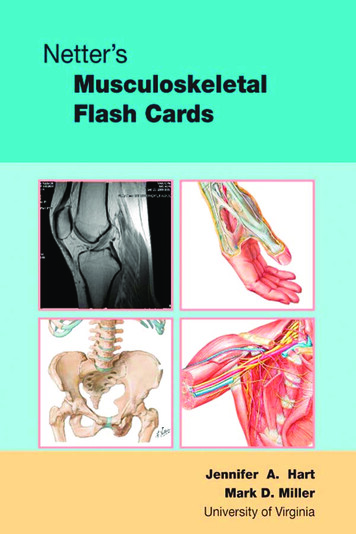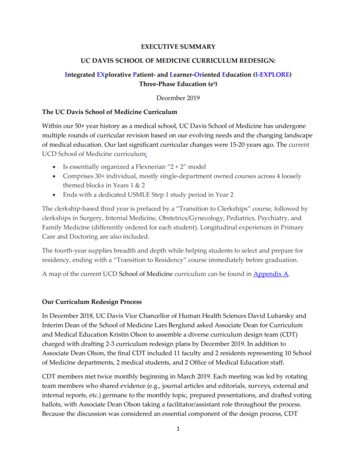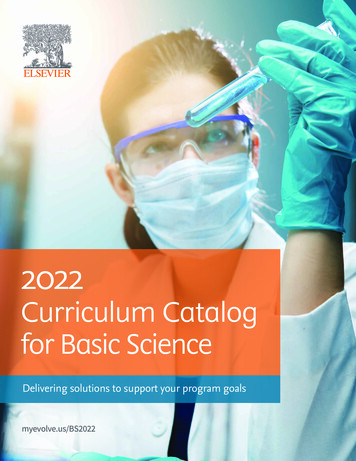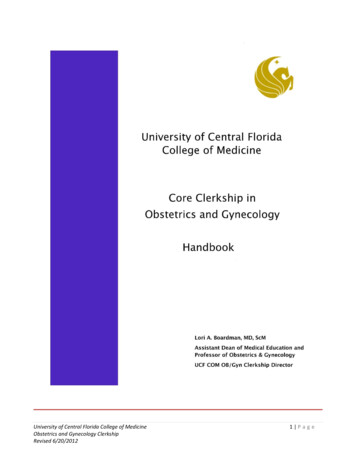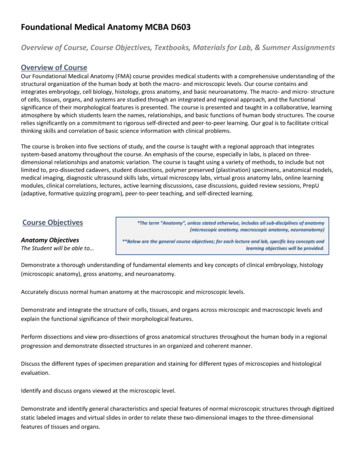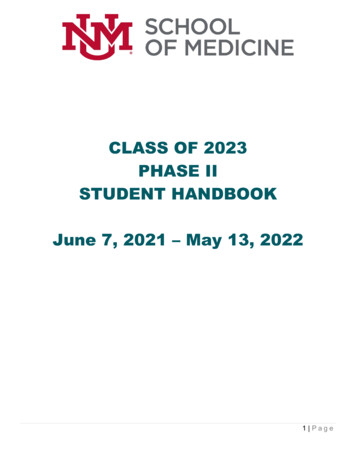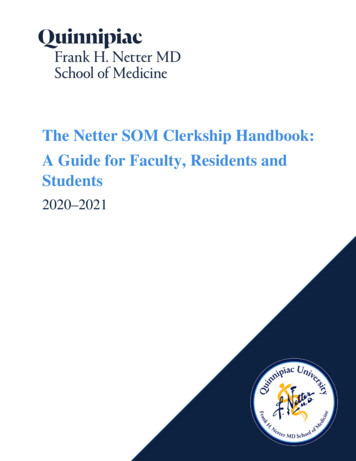
Transcription
The Netter SOM Clerkship Handbook:A Guide for Faculty, Residents andStudents2020–20211
Table of Contents1. Welcome62. Important Contacts83. LMC Overview13a. LMC Format14b. LMC Learning Modalities154. COVID-19175. Student Preparation & Orientation196. LMC Dates207. Student Responsibilities21a. Clinical Level of Responsibilities24b. 10 Ways to Excel in Your Clerkships258. Faculty Responsibilities269. Resident Responsibilities3010. Specialty-Specific LMC Components33a. Internal Medicine Block Information (Cluster A)33i. Sample Daily Schedule33ii. Goals & Learning Objectives34iii. Specialty-Specific Student Responsibilities37iv. Required Cases/Patient Experiences/Procedures37b. Surgery Block Information (Cluster A)38i. Sample Daily Schedule38ii. Goals & Learning Objectives38iii. Specialty-Specific Student Responsibilities40iv. Required Cases/Patient Experiences/Procedures402
c. Primary Care Block Information (Cluster A)42i. Sample Daily Schedule42ii. Goals & Learning Objectives42iii. Specialty-Specific Student Responsibilities44iv. Required Cases/Patient Experiences/Procedures44v. Specialty-specific Graded Learning Components45d. Obstetrics & Gynecology Block Information (Cluster B)46i. Sample Daily Schedule46ii. Goals & Learning Objectives46iii. Specialty-Specific Student Responsibilities47iv. Required Cases/Patient Experiences/Procedures48v. Specialty-specific Graded Learning Components48e. Pediatrics Block Information (Cluster B)50i. Sample Daily Schedule50ii. Goals & Learning Objectives50iii. Specialty-Specific Student Responsibilities52iv. Required Cases/Patient Experiences/Procedures53f. Psychiatry Block Information (Cluster B)57i. Sample Daily Schedule57ii. Goals & Learning Objectives57iii. Specialty-Specific Student Responsibilities58iv. Required Cases/Patient Experiences/Procedures58v. Specialty-specific Graded Learning Components5911. Instructional Methods59a. Clinical Learning59b. Academic Half Days59c. Teaching Attending Sessions593
d. Longitudinal Curriculum (Synchronous)59e. Required Self-Directed Learning60f. Added Self-Directed Specialty Learning Resources60g. Optional Online Modules (Asynchronous)60h. Flex Days6112. Individualized Learning Plan6213. Assessment, Feedback and Grading6363a. Formative Assessmenti.Self-Assessment63ii. Mid-Clerkship Feedback63iii. OSCEs64iv. SCOs64b. Summative Assessmenti.65Clinical Performance Assessment65ii. NBME Examinations65iii. Teaching Attending Evaluation66iv. Other Graded Components for Selected Blocks66c. LMC Grading67d. Student Evaluation of Faculty and LMC6814. Faculty Resources for Assessment and Feedback6915. Student Well-being7116. Safe and Respectful Learning Environment73a. Tools for Creating a Respectful Learning Environment73b. Creating a Respectful and Comfortable LearningEnvironment – Guidance for Facultyc. Diversity and Inclusion76d. Student Mistreatment78784
17. Resources for Students8118. Netter School of Medicine Policies83a. Duty Hours84b. Code of Conduct85c. Student Policies95AppendicesAppendix 1: LMC-Related Netter Educational Program Objectives104Appendix 2: LMC Assessment Forms108Appendix 3: Helpful Medical Apps and Other General Resources135Appendix 4: Faculty Development Resources137Appendix 5: Teaching Attending Guide138Appendix 6: Clinical Re-entry Policy and COVID-19 Essentials143Appendix 7: COVID-19 Exposure Form1565
1. Welcome to the Longitudinal Multi-SpecialtyClerkshipDear Netter M3 Students,On behalf of the faculty at the Frank H. Netter MD School of Medicine, we welcome you to thenew Longitudinal Multi-Specialty Clerkship (LMC) for third-year students.We encourage and welcome feedback and dialogue throughout the year so that we cancontinue to develop this clerkship into the best student experience possible. We are allavailable if you have any questions, concerns, difficulties, uncertainties, or positive commentsyou would like to share.Please note that the Clerkship Director is your central contact person for a given specialty,and the individual who is responsible for your educational experience in that specialty. TheClerkship Director organizes your clinical rotations and didactic sessions and is responsiblefor promoting a safe and stimulating learning environment by working closely with sitedirectors and faculty. The Clerkship Director is also responsible for ensuring that you receivemid-clerkship feedback and for completing your end-of-clerkship summative evaluation form.Finally, the Clerkship Director uses your feedback on the clerkship experience as part of acontinuous educational quality improvement process.The Integrated Block (IB) in each cluster is comprised of clinical sessions from each specialtyin the given cluster. Please reach out to the relevant Clerkship leadership (clerkship directoror clerkship administrator) for any questions related to specific sessions during the IB.This clerkship guide contains essential information about the clerkship for students as well asfaculty and residents. Please read it carefully and feel free to contact any of us with anyquestions or concerns.Best wishes for great success in this clerkship. We look forward to working with you.Robert Brown, MD, Internal Medicine Clerkship DirectorJay Draoua, MD, Psychiatry Clerkship DirectorKhuram R Ghumman, MD, Primary Care Clerkship DirectorEitan Kilchevsky, MD, MBA, FAAP, Pediatrics Clerkship DirectorStacy Spiro, MD, Obstetrics & Gynecology Clerkship DirectorChristine Van Cott, MD, Surgery Clerkship DirectorLyuba Konopasek, MD, Senior Associate Dean for Education6
WelcomeDear Faculty and Residents,Thank you for teaching and training our next generation of physicians. The time you dedicate toteaching, mentoring, assessing, and coaching our students is giving them their foundation fordevelopment as outstanding physicians and inspiring many to choose this specialty.This clerkship handbook contains essential information about the clerkship for students as wellas faculty and residents. This guide explains your roles and responsibilities, and those of yourmedical students. Please read it carefully and feel free to contact any of us with any questionsor concerns.With Thanks,Robert Brown, MD, Internal Medicine Clerkship DirectorJay Draoua, MD, Psychiatry Clerkship DirectorKhuram R Ghumman, MD, Primary Care Clerkship DirectorEitan Kilchevsky, MD, MBA, FAAP, Pediatrics Clerkship DirectorStacy Spiro, MD, Obstetrics & Gynecology Clerkship DirectorChristine Van Cott, MD, Surgery Clerkship DirectorLyuba Konopasek, MD, Senior Associate Dean for EducationLisa Coplit, MD Associate Dean for Faculty Development7
2. Important ContactsInternal MedicineClerkship Director:Robert Brown, MDOffice Location:QU Netter Student Space/HospitalistSuite at SVMCClerkship Administrator:Susan A. RandOffice location:QU Netter Dean’s SuiteSt Vincent’s Medical CenterTel: 475-210-5711Email: robert.brown@hhchealth.orgTel: 203-582-7633Email: Susan.Rand@qu.eduSite Director:Robert Brown, MDStudent Coordinator:Christina TeixeiraGriffin HospitalTel: 475-210-5711Cell:914-924-7363Tel: 475-210-5442Email: robert.brown@hhchealth.orgSite Director:Marya Chaisson, MDStudent Coordinator:Linda PayneWaterbury HospitalTel: 203-732-7144Email: MChaisson@Griffinhealth.orgTel: 203-732-7144Email: lpayne@Griffinhealth.orgSite Director:Danise Schiliro, MDStudent Coordinator:Roseanne ElliottSt. Mary’s HospitalTel: 203-573-7597Email: l: relliot@wtbyhosp.orgSite Director:Carolina Borz-Baba, MDStudent Coordinator:Leigh AroninSt. Francis HospitalTel: 203-709-6424M3 Site Director:John Osowski, MDM4 Site Director:Edgar Naut, MDStudent Coordinator:Justa AliceaTel: 860-714-7124Cell:914-924-7363Tel: 203-573-7194Tel: 203-709-6424Tel: 860-714-7124Tel: Email:carolina.borzbab@trinityhealthofne.orgEmail: fne.orgEmail: jalicea@trinityhealthofne.org8
Obstetrics & GynecologyClerkship Director:Stacy Spiro, MDOffice location:QU Netter Dean’s Suite (Wednesdays)Clerkship Administrator:Angela ScarduzioOffice location:QU Netter Dean’s SuiteSt. Francis Hospital and MedicalCenterSite Director:Karyn HansenSite Administrator:Staci GallagherSt. Vincent’s Medical CenterSite Director:Dr. Stevan MarjanovicSite Administrator:Christina TeixeiraMercy Medical CenterSite Director:Dr. Rebecca BrushwoodSite Administrator:Carmen MartinezBristol HospitalSite Director:Dr. Kamiksha VemareddySite Administrator:Ashley AlcottGriffin HospitalSite Director:Dr. Michael KesslerSite Administrator:Linda PayneSpecialists in Women’s HealthcareSite Director:Dr. David MillerickSite Administrator:Robin BaldwinTel: 203-582-7520Cell: 917-887-5596Email: Stacy.Spiro@qu.eduTel: 203-582-6533Cell: 203-577-9118Email: Angela.Scarduzio@qu.eduTel: rgEmail:SGallagh@TrinityHealthOfNE.orgTel: 860-714-4595Tel: 203-808-2418Email: rsmarj@comcast.netTel: Tel: 203-858-7844Tel: mail:Carmen.S.Martinez@sphs.comTel: 630-362-3235Email: kvemared@bristolhospital.orgTel: 860-585-3312Email: aalcott@bristolhospital.orgTel: 203-516-5303Email: MKessler@Griffinhealth.orgTel: 203-732-7144Email: LPayne@Griffinhealth.orgTel: 860-620-3868Email: davemillerick@gmail.comTel: 203-754-2535Email:rbaldwin@womenshealthct.com9
PediatricsClerkship Director:Eitan Kilchevsky, MDOffice location:QU Netter Dean’s Suite (Wednesdays)Clerkship Administrator:Casey LoRussoOffice location:QU Netter Dean’s SuiteConnecticut Children’s MedicalCenterSite Director:Melanie Rudnick, MDAdministrative Coordinator:Brian LesmeAdministrative Coordinator:Andrea RichardsonAdministrative Coordinator:Katherine LopezLead Preceptor:Christine Rader, MDSt. Mary’s - Connecticut Children’sMedical CenterSite Director:Marta Neubauer, MDAdministrative Coordinator:Brian LesmeAdministrative Coordinator:Andrea RichardsonLead PreceptorRotating ScheduleChildren’s Hospital at Sacred HeartMedical Director - University ofFlorida Pediatric Hospitalist Service:Erica Whittingham, MD, FAAPStudent Coordinator:Adam PeakeSt. Vincent’s Medical CenterNewborn Nursery/NICUDirector, NICU/Nursery:Joseph Vitterito, MDTel: 203-582-7713(Only Wednesdays)Student Coordinator:Christina TeixeiraSt. Francis Medical Center NewbornNursery/NICUDirector, NICU & Interim Chairman,Department of Pediatrics:Jose M. Arias-Camison, MDEmail: Eitan.Kilchevsky@qu.eduCell: 203-525-0471Tel: 203-582-7713Cell:203-525-0471Email: casey.lorusso@qu.eduTel: ens.orgTel: 860-558-3125Tel: 860-545-8347Tel: 860-545-9366Tel: 860-545-9520Tel: s.orgTel: 860-558-3125Tel: Email:arichardson@connecticutchildrens.orgTel: 860-837-5502Email: e.whittingham@ufl.eduTel: 850-416-1181Email: Adam.Peake@ascension.orgTel: 475-210-5311Email: rgTel: Tel: 860-714-5407Email: jarias@trinityhealthofne.org10
Primary CareClerkship Director:Khuram R Ghumman, MDOffice Location:East GranbyClerkship Administrator:Martha SantoemmaOffice Location:QU Netter MNH-207Tel: 203-582-7873Email: Khuram.Ghumman@qu.eduCell:302-690-6848Tel: 203-582-7634Email: Martha.Santoemma@qu.eduTel: 203-221-8861Cell: 914-393-8023Email: jay.draoua@hhchealth.orgTel: 203-582-3889Email: rita.pacheco@quinnipiac.eduTel: 203-221-8804Email: andre.newfield@hhchealth.orgTel: 203-221-8847Email: Jamie.gilbert@hhchealth.orgTel: ealth.orgPsychiatryClerkship Director:Jay Draoua, MDOffice Location:St. Vincent’s Behavioral HealthServices, Westport, CTClerkship Administrator:Rita PachecoOffice Location:QU Netter MNH-302Site Chair:Andre Newfield, MDSite Office Coordinator:Jamie GilbertSurgeryClerkship DirectorChristine Van Cott, MDOffice location:St. Vincent’s Medical Center,Bridgeport, CTClerkship Administrator:Julia O’ConnorOffice location:QU Netter Dean’s SuiteSt. Francis HospitalSite Director:Edward White, MDSite Administrator:Kristine MeinertWaterbury HospitalSite Director:Scott Kurtzman, MDSite Administrator:Deborah CiprianoTel: 203-582-4503(QU)Tel: 203-582-4503Email: jaoconnor@qu.eduTel: l:Tel: Tel: 203-573-6073Tel: :Deborah.Cipriano@wtbyhosp.org11
Griffin HospitalSite DirectorRichard Salzano, MDSite AdministratorLinda PayneMidstate Medical CenterTel: 203-732-1352Email: RSalzano@griffinhealth.orgTel: 203-732-7144Email: LPayne@Griffinhealth.orgSite DirectorAziz Benbrahim, MDSite AdministratorValerie CastilloTel: l: Valerie.castillo@hhchealth.orgTel: 203-238-2691Medical EducationSenior Associate Dean for EducationLyuba Konopasek, MDAdministrative Assistant:Marlene StellatoTel: 203-582-7459Email: Lyuba.Konopasek@qu.eduTel: 203-582-7716Email: Marlene.Stellato@qu.eduTel: 203-582-4859Email: Kim-Thu.Pham@qu.eduTel: 203-582-6595Email: Elissa.Carroll@qu.eduTel: 203-582-7647Email: Laura.Mourao@qu.eduTel: 203-582-6493Email: Lisa.Coplit@qu.eduTel: 203-582-8803Email: Katie.Lyons@qu.eduStudent AffairsAssociate Dean for Student AffairsKim Pham, MD, MPHDirector of Student AffairsElissa CarrollAdministrative Assistant:Laura MouraoFaculty DevelopmentAssociate Dean for FacultyDevelopmentLisa Coplit, MDProgram Coordinator:Katie Lyons12
3. Longitudinal Multi-Specialty Clerkship (LMC)OverviewBackgroundThe COVID-19 pandemic has resulted in significant changes in the clinical learningenvironment that have affected medical students’ clinical education. Beginning July 20,2020, the third-year students of the Netter School will begin their re-entry into achanged clinical learning environment (CLE). There is a potential for some clinicalcapacity shortfalls due to fewer COVID-19 negative patient seeking care, socialdistancing expectations and a surge of learners returning to the clinical setting. Therealso is a potential for additional surges of COVID-19.To avoid a negative impact on the required clerkship rotations for third year students,facilitate the timely student re-entry into clinical settings and optimize medical studenteducation in a CLE with some uncertainty, Quinnipiac University’s Frank H. Netter MDSchool of Medicine developed a novel Longitudinal Multi-Specialty Clerkship (LMC) forthird-year students.The design of the LMC is compliant with Liaison Committee on Medical Educationaccreditation requirements and with Quinnipiac University/Netter School policies andprocedures for safe student re-entry into the clinical setting. Components includeadherence to a clinical re-entry protocols being developed by the three QU healthscience schools, an opt-in/opt-out policy, COVID-19 screening (Appendix 6), testingprotocols and the post-exposure protocol (Appendix 7). Additionally, all students mustcomplete the COVID-19 Essentials course on Blackboard prior to clinical entry.Students will also utilize a clinical re-entry dashboard and AMiON for scheduling.LMC GoalsThe LMC is designed to ensure a robust, flexible learning experience that ensurescoverage of core content. It is organized in a flexible format that includes:1. The option to adapt clinical learning in response to fluctuations in volume in clinicalsettings and the potential for future surges or a significant continuing volume ofCOVID-19 in the community;2. Alternative learning experiences to reduce any detrimental impact of the pandemicand post-pandemic volume on student learning, integration and application of corecontent and acquisition of competencies;3. A student- and relationship-centered learning format, with learning support for allstudents;13
4. Completion of all third-year Netter and LCME learning requirements and an on-timestart for the 4th year;5. Added flexibility, at the individual level, to student illness and self-isolation, andstudents needing to opt out of clinical learning due to threats to their own health (eg,pregnant, immunocompromised).LMC Learning ObjectivesLMC learning objectives are comprised of the individual the specialty-specific learningobjectives which link to the Netter Educational Program Objectives (EPOs). SeeAppendix 1a. LMC FormatThe LMC experience is intended to offer an excellent clinical education experience overa 36-week period. It was designed collaboratively with student, faculty and leadershipinput. It consists of two 18-week LMC Clusters (16 weeks of clinical experiences oralternative learning and 2 weeks for preparation and taking the 3 clerkshipexaminations). Cluster A consists of Internal Medicine, Primary Care, and Surgeryspecialties. Cluster B consists of Obstetrics & Gynecology, Pediatrics, and Psychiatry.Cluster A (Medicine/Primary Care/Surgery)Track1234Week 1-4Primary CareIntegratedSurgeryInternal MedicineWeek 5 -8SurgeryInternal MedicineIntegratedPrimary CareWeek 9-12IntegratedPrimary CareInternal MedicineSurgeryWeek 13- 16Inpatient MedicineSurgeryPrimary CareIntegratedCluster B (Ob-Gyn/Pediatrics/Psychiatry)Track1234Week 1-4PediatricsPsychiatryIntegratedOb/GynWeek 5 -8PsychiatryIntegratedOb/GynPediatricsWeek 9-12IntegratedOb/GynPediatricsPsychiatryWeek 13- 16Ob/GynPediatricsPsychiatryIntegratedWeeks 17 and 18 are for focused study and administration of NBME shelf exams.14
NBME Shelf exams will be offered at the end of Week 12 as well as three times duringWeek 17 and 18. Students may choose three out of four dates offered and specialty foreach date.Integrated BlockThe 4-week Integrated Block is designed to provide additional clinical experiences for allthree of each cluster’s specialties. This block is also designed to be more flexible instructure so that it can be redesigned to accommodate changes in the clinicallandscape related to COVID-19. Each week of the block includes one Academic HalfDay, two Flex Days, and clinical learning experiences. The LMC’s LongitudinalCurriculum is scheduled for one session during the IB in each Cluster. There are noTeaching Attending sessions during this block. Students clinical work during this blockfeeds into the grading schema for each clerkship.b. Clinical Learning ModalitiesClinical learning experiences will be supplemented with synchronous and asynchronousremote learning opportunities.15
Clinical Learning Experience4-week Specialty Blocks – primarily single-specialty inpatient and outpatient experiences4-week Integrated Blocks – primarily outpatient experiences and hospital-based experiences in radiology andanesthesiologyTeaching RoundsAcademic Half Days1.5 hours , 1-2 small group Zoom sessions/weekfor 4 weeks in each specialtyOnce/weekLectures & Case Discussionsvia ZoomClinical reasoning sessions based upon patientpresentationsLongitudinalCurriculumHealth SystemsScience, IPE, RacialJustice and HealthCare Equity,AdvancedCommunication SkillsPrimarily via ZoomFlex TimeService Learning,Self-Study, Self Care,Coaching, SimulatedTele-Health, MakeUp Clinical TimeTwo half-days perweek duringIntegrated BlocksAcademicCoachingAsynchronousOnline LearningCareer Advisorcoaching withdevelopment ofIndividualizedLearning PlanCore Emphasis Areas, Aquifercases, other asynchronousmodulesAssessmentsAssessment of students will include clinical evaluations, direct observation withfeedback, teaching attending evaluation, NBME shelf exams, self-assessment,Objective Structured Clinical Exams, and additional specialty-specific assessments (seethe assessment section). Students will receive regular feedback throughout each 18week Clinical Cluster and take practice NBME exams. The summative NBME examswill be offered four times at the end of each cluster. Students will be able to choose thedate and specialty for each NBME exam. See the assessment, feedback, and gradingsection for details.16
4. COVID-19The School of Medicine is looking forward to the M3 student clinical re-entry on July20th, 2020, and several policies and safeguards are in place including the QU ClinicalRe-entry Policy. All students, residents, and faculty must carefully review thispolicy in Appendix 6 which includes all COVID related School of Medicine policies.Please note that our criteria for re-entry include:1. Adequate PPE supply and criteria for student use Adequate PPE will bedefined by the CDC recommendations (Using PPE). Students should receive thesame level of PPE as other health care providers at the clinical site. Each ClinicalSite should ensure provision of adequate Personal Protective Equipment. Forclinical sites that are unable to provide adequate PPE, the School/Program willprovide PPE for the students’ use.2. Appropriate patient volume and case-mix Each School/Program shouldestablish criteria aligned with accreditation standards.3. Adequate staffing to provide supervision and teaching Each School/Programshould follow existing criteria for supervision and teaching.4. Defined rules for clinical engagement Students will not be assigned toprovide direct care (with direct patient contact) for patients who aresuspected or known to have tested positive for COVID-19All of our learners have Opted In for clinical rotations and are eager to begin. Pleasesee the Opt In/Opt Out form which they filled out.COVID EssentialsStudents must have all completed our COVID Essentials modules which includedprotocols for screening, procedure to follow for symptoms, PPE use, testing and postexposure, as well as rules of clinical engagement.We have asked all of our learners to screen themselves for symptoms followingguidelines below:QU COVID Protocol for students entering clinical rotationsAll requirements must be completed before students can attend clinical rotations andexperiences at QU SOM, SON and SHS affiliated sites.a) Monitor yourself for symptoms using this checklist for 14 days prior to starting yourclinical rotation, and daily during your rotation:17
Do you have a temperature of greater than 100.0 F? Monitor temperature twice aday Do you have new muscle aches not related to another medical condition oranother specific activity (e.g. due to physical exercise)? If so, take temperature. Do you have sore throat not related to another medical condition (e.g. allergies)? Do you have a new or worsening cough that is not related to another medicalcondition? Do you have shortness of breath that is not attributable to another medicalcondition? Do you have recent ( 5 days) loss of smell and taste? Do you have new onset of vomiting or diarrhea not related to another medicalcondition?If you answer yes to any of these questions, notify Student Health, yourSchool/Program, and your clinical supervisor. Contacts for each school are listedbelow:School of Medicine: Associate Dean for Student AffairsNOTE: Self-monitoring for symptoms and exercising an abundance of caution whenin any doubt or new symptoms are developing is an essential element ofprofessionalism during this time. It is critical for you, your patients and yourcolleagues that you do not arrive at clinical or educational settings with any potentialsymptoms listed above.COVID-19 ExposureThe Netter Exposure Policy includes details of what constitutes an exposure andmeasures to take if exposed18
5. Student Preparation and OrientationIn order to participate in face-to-face clinical learning, you must sign the Opt In/Opt OutForm and complete the COVID Essentials course on Blackboard. Additionally, pleasebe sure to review the Post-Exposure Policy and Procedure.In preparation for the LMC, each student must do the following: Review the detailed site description and clerkship requirements that the ClerkshipAdministrator will email to you prior to the start of your experience. Contact the Clerkship Administrator and Administrator to ask about any additionalsite-specific paperwork you may need to fill out prior to your clerkship. Completion ofthis paperwork is vital to ensure you have access to all administrative programs onthe first day of your clerkship. Review the clerkship syllabus and handbook carefully, as all requirements andexpectations are included. Pay close attention to specific curricular areas, yourrequired tasks, the readings links and the evaluation policies. We will also reviewthis information at orientation. Review the SOM absence policy and duty hours policy. Prepare for travel to your clinical site. Review and bookmark the Longitudinal Multi-Specialty Clerkship in Blackboard.The LMC follows all School of Medicine Policies regarding COVID-19 Essentials,Infection Prevention, Sharps Management, Immunization, Blood borne pathogens etc.The policy documents can be found in Blackboard for review.Key dates for the LMC are shown on the next page. Also refer to AMiON, Blackboard,the ZOOM Calendar for up-to-date information, schedules, handouts, and sessionobjectives and content. Emails will be sent out regularly during the academic year withchanges or updates.19
6. LMC DatesYear 3 LMC BlocksSECTION / GROUP 1Y3 Block 1Y3 Block 2Y3 Block 3Y3 Block 4Focused Study and ExamsThanksgiving HolidayGROUP/SECTION 2Y3 Block 5aDecember HolidaysY3 Block 5bY3 Block 6Y3 Block 7Y3 Block 8Focused Study and ExamsBlock Dates7/20/20 - 8/14/20Weeks 1-48/17/20 – 9/11/20Weeks 5-89/14/20 – 10/9/20Weeks 9-1210/12/20 – 11/6/20Weeks 13-1611/9/20 – 11/20/20Weeks 17 and 18Notes9/7 Labor Day9/28 Yom KippurNBME Exam option Friday 10/911/21/20 – 11/29/20NBME Exam Monday 11/9NBME Exam Monday 11/16NBME Exam Friday 11/20Off11/30/20 – 12/18/20Weeks 1-312/21/20 – 1/3/21Off1/4/21 – 1/8/21Week 41/11/21 -1/29/21Weeks 5-82/1/21 – 2/26/21Weeks 9-123/1/21 – 3/26/21Weeks 13-163/29/21 -4/9/21Weeks 17 and 181/18 Martin Luther King DayNBME Exam Option Friday 2/26NBME Exam Monday 3/29NBME Exam Monday 4/5NBME Exam Friday 4/94/2 Good Friday20
7. Student ResponsibilitiesPatient Care and Advocacy1. Students are expected to introduce themselves to all members of theirteam and the patients. They should identify themselves as third-yearmedical students from the Frank H. Netter School of Medicine atQuinnipiac University and state their role. Students should demonstrategratitude to patients for allowing student involvement in their care.2. Students should have the most in depth knowledge about their patients,which should include the patient’s medical history, hospital course, dailyupdates and physical exam findings, vital signs, medications, andmanagement plan. Students should study their patient’s problems anddiseases. The attending physician will closely supervise the student in thisprocess. Students must take care to adhere to all HIPAA rules.3. Early on, students may have fewer patients and as the student’s abilitiesprogress, students will be able to carry more patients on their inpatientcensus and see more patients in outpatient settings. Clerkship directorswill provide specific guidance about expected numbers of patients perstudent.4. On inpatient rotations, students should pre-round on their own patients(gather all pertinent data, patient concerns, overnight changes, perform aphysical exam) each day.5. Students should arrange for all required care for their patients undersupervision of the intern, resident and attending physician. Students shouldask how they can be helpful to their teams and contribute to the care ofother patients in an equitable manner when the team is busy. However,the role of the student is not to complete the less desirable work for theteam, e.g., booking follow up appointments, calling consults and updatingsign outs for the teaching team.Communication with Patients, Families, and Other Health Care Providers6. Medical students serve a critical role in communication between the teamand patients and their families, and the student should serve as thepatient’s primary point of contact. The student should take care to aligncommunications about diagnosis and therapy with the team’s plan of care.For patients, whose primary language is not English, students shouldalways use interpreter services as per each clinical site’s protocol.Overestimation of physicians’ and medical students’ language skills can bea major cause of miscommunication and a risk to patient safety.21
7. Students should be present at all morning and afternoon sign outs with theinpatient teams on the inpatient service.8. Students should round with the team and be prepared to present theirpatients to the attending and/or resident, including all pertinent data, patientconcerns, overnight changes, and physical exam.9. Students are responsible for reviewing the EMR and writing daily progressnotes at least daily and at appropriate intervals (per thediscipline/specialty). All notes must be cosigned.10. Students should connect with the care team (nurse, nursing assistant, etc.)throughout the day and report to the team on updates from any consultingmedical or surgical services or allied health professionals (physical therapy,respiratory therapy, etc.)11. The student should connect with the assigned nurse for updates andmonitor and report on updates from any consulting services or allied healthprofessionals.Learning12. All students are required to attend Academic Half Days, TeachingAttending sessions, and clinical assignments. Preparation for didacticsessions and Teaching Attending sessions is expected. Students shouldengage in self-directed learning on a daily basis with a focus on theirpatients’ clinical issues. Any site-specific conferences (Grand Rounds,M&M, Tumor Board, etc.) should also be considered required, unlessinformed otherwise.13. Each student will develop an
1 . The Netter SOM Clerkship Handbook: A Guide for Faculty, Residents and Students . 2020-2021
